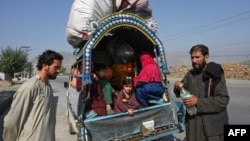Pakistan said Friday that it would deport all undocumented immigrants, including 1.7 million Afghans, in a "phased and orderly" manner, as it sought to allay fears of mass arrests and deportations.
On Tuesday, the government ordered all foreigners residing illegally in Pakistan to return to their respective countries by November 1 or face deportation, a move Afghanistan's Taliban rulers swiftly decried as "inhumane." Global human rights groups also called on Pakistani authorities to review the decision.
Foreign Ministry spokesperson Mumtaz Zahra Baloch defended the policy Friday while responding to the criticism, saying that the decision to expel illegal migrants was in line with "our sovereign domestic laws," and that the government was determined to enforce them.
Baloch told reporters in Islamabad the crackdown was not directed against Afghans only, saying it would target all foreigners who were overstaying their visas and did not possess valid documentation.
"This policy will apply to all individuals of all nationalities, and there is no discrimination in that respect," she said. Baloch underscored that the campaign would not target the 1.4 million legal Afghan refugees hosted by Pakistan for years.
"The U.N. High Commissioner for Refugees in Pakistan has registered them, and they are considered documented individuals," she said.
Departures begin
Baloch and independent sources confirmed Friday that many immigrant families had "voluntarily" started leaving for Afghanistan.
Pakistan has hosted millions of Afghan refugees who fled the Soviet invasion of Afghanistan in 1979 and the subsequent Afghan civil war.
However, many returned to their native country after the United States and its allies invaded Afghanistan in 2001 to punish the Taliban rulers at the time for harboring al-Qaida leaders blamed for plotting deadly terrorist strikes on U.S. cities.
A fresh wave of Afghan refugees hit Pakistan after the hard-line Taliban seized power from an American-backed government in Kabul in August 2021.
Pakistani officials estimate they have since received about 700,000 Afghans fleeing the Islamist Taliban's return to power and deteriorating economic conditions in the country.
Nearly 200,000 have been or are being relocated to the U.S. and Europe in recognition of their services to U.S.-led international forces during their two-decade presence in Afghanistan.
About 500,000 more Afghans entered Pakistan illegally, or their visas have expired, and they are among those facing deportation, according to officials.
Pakistani Interior Minister Sarfaraz Bugti, while announcing the crackdown against illegal migrants on Tuesday, cited growing terrorist attacks in the country. Bugti blamed militants operating out of Afghan sanctuaries for the deadly violence. He claimed that Afghan nationals had carried out 14 of 24 suicide bombings in Pakistan this year.
Baloch reiterated Friday that the outlawed Tehrik-i-Taliban Pakistan, or TTP, was orchestrating the cross-border terrorism and said her government was discussing the issue with de facto Afghan authorities.
"We believe that there are hideouts and sanctuaries of TTP inside Afghanistan. Many of the terrorist incidents that we have seen in recent weeks and months have connections with elements inside Afghanistan," she said.
"Pakistan's concerns have been very clearly communicated to the Afghan side, and we have asked them to disarm these entities and rein in so that Afghan territory does not become a launching pad for terrorist attacks in Pakistan."
The Taliban reject allegations they allow TTP or any other group to use Afghan soil against other countries, including Pakistan.






